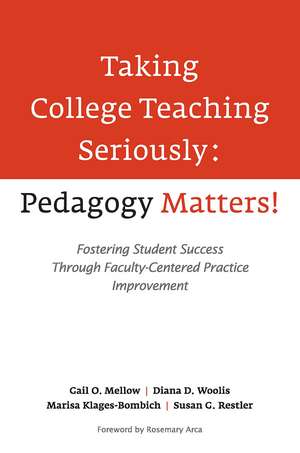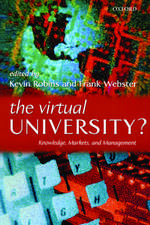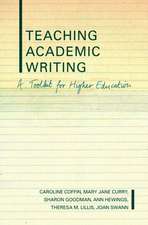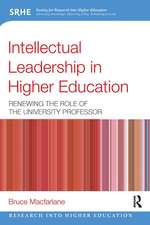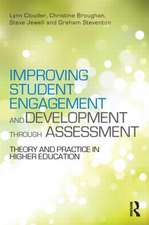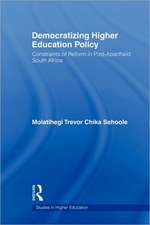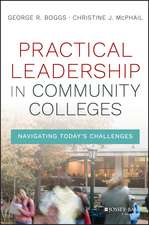Taking College Teaching Seriously - Pedagogy Matters!: Fostering Student Success Through Faculty-Centered Practice Improvement
Autor Gail O. Mellow, Diana D. Woolis, Marisa Klages-Bombich, Susan Restleren Limba Engleză Paperback – 28 mai 2015
| Toate formatele și edițiile | Preț | Express |
|---|---|---|
| Paperback (1) | 274.34 lei 6-8 săpt. | |
| Taylor & Francis – 28 mai 2015 | 274.34 lei 6-8 săpt. | |
| Hardback (1) | 995.85 lei 6-8 săpt. | |
| Taylor & Francis – 8 iun 2015 | 995.85 lei 6-8 săpt. |
Preț: 274.34 lei
Nou
Puncte Express: 412
Preț estimativ în valută:
52.49€ • 54.81$ • 43.35£
52.49€ • 54.81$ • 43.35£
Carte tipărită la comandă
Livrare economică 15-29 aprilie
Preluare comenzi: 021 569.72.76
Specificații
ISBN-13: 9781620360804
ISBN-10: 1620360802
Pagini: 140
Dimensiuni: 152 x 229 x 10 mm
Greutate: 0.21 kg
Ediția:1
Editura: Taylor & Francis
Colecția Routledge
Locul publicării:Oxford, United Kingdom
ISBN-10: 1620360802
Pagini: 140
Dimensiuni: 152 x 229 x 10 mm
Greutate: 0.21 kg
Ediția:1
Editura: Taylor & Francis
Colecția Routledge
Locul publicării:Oxford, United Kingdom
Public țintă
Postgraduate and Professional Practice & DevelopmentCuprins
Acknowledgments Foreword Preface Scope of the Book Introduction. Pedagogy and American Higher Education 1. The Contours of Practice Improvement 2. Theory of Change 3. Pedagogy Matters Tools and Routines 4. Scaffolding the Community 1. Coaching and Sharing 5. Scaffolding the Community 2. Norms and Infrastructure 6. Taking College Teaching Seriously. A Call to Action Appendix References Index
Notă biografică
Marisa Klages-Bombich, Susan Restler
Recenzii
“The value of this book for faculty lies in its accessibility and in its applicability: any faculty member, or group of faculty members of the same institution or across institutions, can easily replicate one or more of the processes described and explained in this book and so heighten their potential for acquiring some of the lessons learned.”
Reflective Teaching (Wabash Center)
“The focus of this book on teaching in community college settings is particularly important given the expectations of student learning outcomes in today’s 2-year institutions and the number of students at these colleges enrolled in developmental education courses. The authors of the book concentrate on the need to provide ‘professional development of all faculty who teach the hardest to serve’. The focus on developmental course instructors offers strategies that can translate to other programs in community colleges. Their attention to faculty development builds on what the authors identify as the role of reflecting on teaching practices and on building competencies in faculty members regarding good classroom pedagogy.
A strength of the book is that it focuses attention on improving classroom teaching by using reflective practice and SoTL techniques, all situated in a collaborative learning environment created within a community of practice. Borrowing from this strategy, individual campuses or colleges in a system could replicate this type of faculty development.
Because it is rare to find a volume that focuses on pedagogy in higher education contexts, particularly at the community college level, I would recommend this book to those new to community college teaching or academic leadership, to faculty development directors at 2-year colleges, and to those overseeing developmental math and English programs. The passion of the authors for improving teaching is evident, and the early successes of the model hold promise for the future.”
Community College Review
“When I joined the project, what I wanted back was the energy of collaboration, the challenges of feedback, and finally the creativity that comes from conversations with passionate teachers who love what they do. I wanted to get out of the office and talk to really smart people who delighted in imagining the best way to teach paragraph development or factoring polynomials. I wanted to be ‘forced’ to reevaluate the routines I’d developed over 37 years of teaching, and I wanted to be challenged to try new technologies that might have some value to add in today’s classroom.
For me, the process was heady and humbling. The weekly posts about what we did in one lesson in one class, and the reflection about that class, were powerful meditations on what I was doing in the classroom. I had to be an honest reporter of my own practice by using the categories of reflection required by the project. I gained a deeper understanding of pedagogy and what worked (or didn’t) in the lesson I’d taught and recorded.
The very humbling part of the process came when I 'entered' my colleagues’ virtual classrooms and watched them teaching via video excerpts or read their posts. Then I noted the amazing proactivity of their lessons that demonstrated their knowledge of individual student issues and careful planning to enable student success. Many of us completely restructured our lesson plans after we saw how powerful our colleagues’ lessons were in ensuring students mastered a concept in our discipline."
Rosemary Arca, faculty participant, English professor
Foothills Community College, California
"It is clear that the authors have great passion for researching and improving community college teaching and helping struggling community college students in developmental courses. Their advocacy concerning the importance of technology in education and its capacity to foster and inform the work of teachers and consequently student achievement is to be admired. Overall, Taking College Teaching Seriously: Pedagogy Matters! is an insightful, data-driven publication offering real-world advice on the college teaching experience. The book rightly reminds those in higher education of the importance of pedagogy and its impact on today’s community college students."
Mid-Western Educational Researcher
Reflective Teaching (Wabash Center)
“The focus of this book on teaching in community college settings is particularly important given the expectations of student learning outcomes in today’s 2-year institutions and the number of students at these colleges enrolled in developmental education courses. The authors of the book concentrate on the need to provide ‘professional development of all faculty who teach the hardest to serve’. The focus on developmental course instructors offers strategies that can translate to other programs in community colleges. Their attention to faculty development builds on what the authors identify as the role of reflecting on teaching practices and on building competencies in faculty members regarding good classroom pedagogy.
A strength of the book is that it focuses attention on improving classroom teaching by using reflective practice and SoTL techniques, all situated in a collaborative learning environment created within a community of practice. Borrowing from this strategy, individual campuses or colleges in a system could replicate this type of faculty development.
Because it is rare to find a volume that focuses on pedagogy in higher education contexts, particularly at the community college level, I would recommend this book to those new to community college teaching or academic leadership, to faculty development directors at 2-year colleges, and to those overseeing developmental math and English programs. The passion of the authors for improving teaching is evident, and the early successes of the model hold promise for the future.”
Community College Review
“When I joined the project, what I wanted back was the energy of collaboration, the challenges of feedback, and finally the creativity that comes from conversations with passionate teachers who love what they do. I wanted to get out of the office and talk to really smart people who delighted in imagining the best way to teach paragraph development or factoring polynomials. I wanted to be ‘forced’ to reevaluate the routines I’d developed over 37 years of teaching, and I wanted to be challenged to try new technologies that might have some value to add in today’s classroom.
For me, the process was heady and humbling. The weekly posts about what we did in one lesson in one class, and the reflection about that class, were powerful meditations on what I was doing in the classroom. I had to be an honest reporter of my own practice by using the categories of reflection required by the project. I gained a deeper understanding of pedagogy and what worked (or didn’t) in the lesson I’d taught and recorded.
The very humbling part of the process came when I 'entered' my colleagues’ virtual classrooms and watched them teaching via video excerpts or read their posts. Then I noted the amazing proactivity of their lessons that demonstrated their knowledge of individual student issues and careful planning to enable student success. Many of us completely restructured our lesson plans after we saw how powerful our colleagues’ lessons were in ensuring students mastered a concept in our discipline."
Rosemary Arca, faculty participant, English professor
Foothills Community College, California
"It is clear that the authors have great passion for researching and improving community college teaching and helping struggling community college students in developmental courses. Their advocacy concerning the importance of technology in education and its capacity to foster and inform the work of teachers and consequently student achievement is to be admired. Overall, Taking College Teaching Seriously: Pedagogy Matters! is an insightful, data-driven publication offering real-world advice on the college teaching experience. The book rightly reminds those in higher education of the importance of pedagogy and its impact on today’s community college students."
Mid-Western Educational Researcher
Descriere
This book presents a model of embedded professional development, which capitalizes on the affordances of technology to enable groups of faculty to examine their practice in a non-evaluative context, but with a clear focus on improvement.
